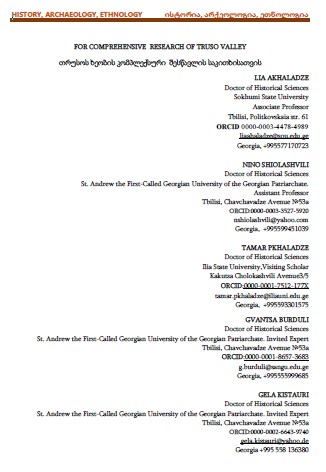1989 წლის 9 აპრილის ტრაგედიის შემდგომ საქართველოში მომხდარი ზოგიერთი მოვლენის შეფასებისათვის
TO ASSESS SOME OF THE EVENTS THAT TOOK PLACE IN GEORGIA AFTER THE TRAGEDY OF APRIL 9, 1989
Author(s): Aleksandre MosiashvilSubject(s): Local History / Microhistory, Political history, Studies in violence and power, Post-War period (1950 - 1989), Inter-Ethnic Relations, Peace and Conflict Studies
Published by: სსიპ-გორის სახელმწიფო უნივერსიტეტი
Keywords: A Tragedy; Provocations; Kremlin; Antidote; National Movement;
Summary/Abstract: Much is known to Georgian historiography about the tragic events that took place on April 9, 1989 on Rustaveli Avenue in front of the Government House in Tbilisi. Its subsequent events have also been studied and researched. But there are some questions to explore the rest of the issue to the end. Familiarity with certain bibliographic materials, observation and analysis allows them to re-think some issues and draw appropriate conclusions. It should be noted that after the incident, the leaders of the communist regime did not hesitate to cover up what was done and as if to prove their innocence. It should be noted that they are responsible for what happened and every attempt to blame someone else is doomed to failure from the very beginning. First, the Protest action, which began on April 4, was peaceful, and second, its end was announced on April 14, and there was no reason for its dissolution, even with such barbaric methods. That is why they did not believe in what happened and tried to blame the participants of the protest or the organizer of the protest action - the leaders of the National Movement. Then tried to give by force the poisonous substances used by their butchers for the citizens, or to launch them in various institutions in order to blame the use of these chemicals on the national forces and the Georgian people in general. When they realized that they could not achieve the goal and could not deceive people with provocations, then they resorted to another method. Began to organize provocations to provoke conflicts. Provocations were mainly organized in different regions of Georgia. Particular emphasis was placed on organizing bloody confrontations on ethnic grounds. The aim was to discredit the national liberation movement in such conditions, to get involved in the so-called ethnic conflicts in Georgia (as they later baptized themselves) and to use the situation to their advantage - to somehow preserve the Russian Empire and save it from the collapse that was inevitable.
Journal: ისტორია, არქეოლოგია, ეთნოლოგია
- Issue Year: 2021
- Issue No: 6
- Page Range: 219-227
- Page Count: 9
- Language: Georgian

